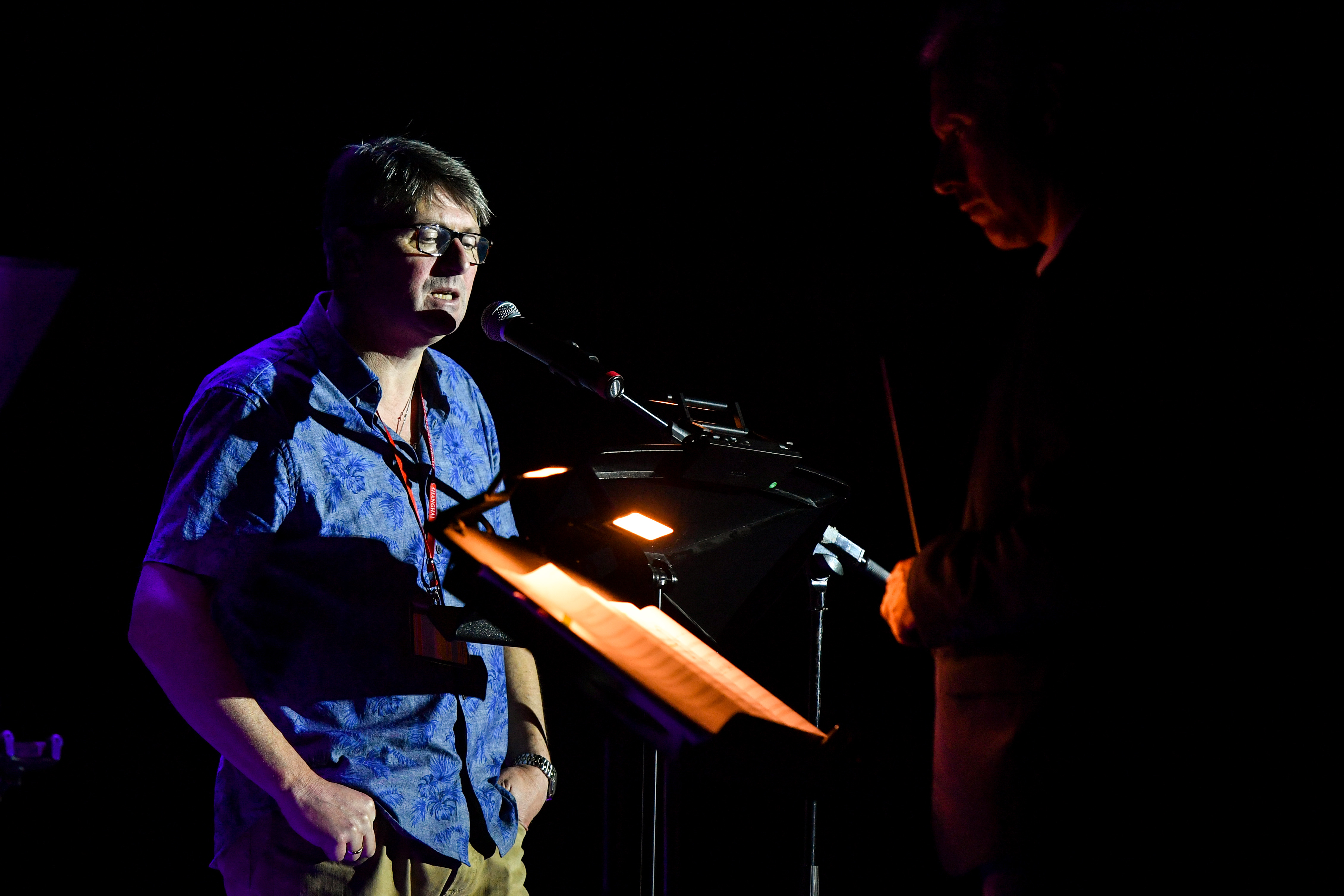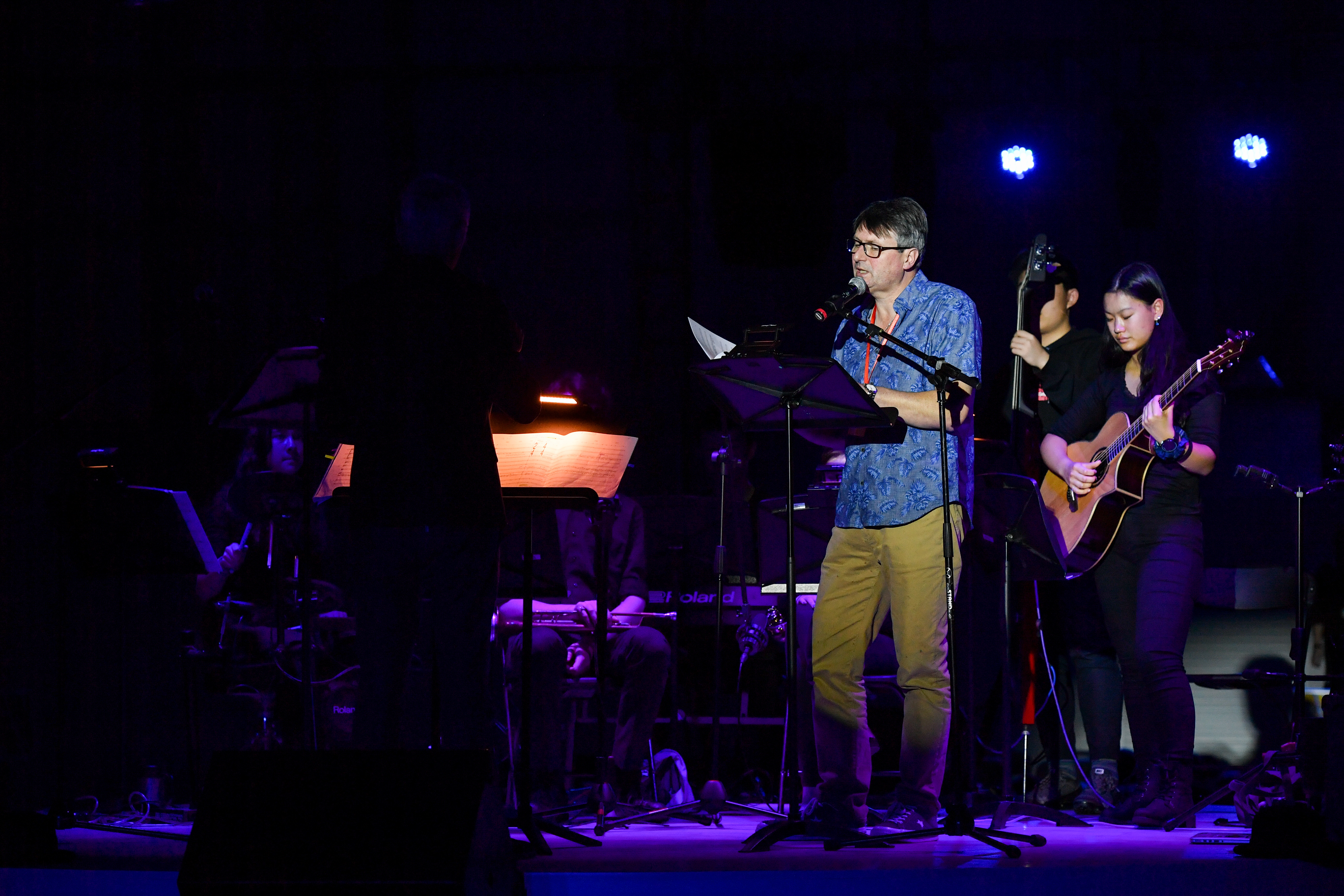A reflection on Simon Armitage, poet laureate
25 Sep 2019
In May 2019, Simon Armitage was appointed as the UK’s 21st poet laureate, succeeding Carol Ann Duffy.
As many of you will no doubt remember, Simon’s poetry and his presence in the College were the starting inspiration for last year’s Arts Festival’s central performance of ZOOM!, a highly original whole-school event, which saw three days of rehearsals come together in an unforgettable performance of light, sound and choreographed movement, which accompanied a choral poetry recital. In light of its success, ZOOM! has been included in the official programme of the upcoming BBC ‘Contains Strong Language’ Festival, a three-day festival dedicated to exploring poetry and the spoken word. The College's Director of Culture, reflects on the elevation of Simon Armitage to Britain’s highest literary honour, and the value of taking risks, keeping an open mind and staying true to oneself.  Simon came to prominence in the 1990s and it’s fair to say that his pathway into poetry was not conventional. He was a working-class Yorkshire boy who went to Portsmouth Polytechnic to read geography and started his professional life as probation officer, like his father had before him. Traditionally, ‘serious’ literary people went to Oxford or Cambridge, had the right credentials, and had always wanted to be writers. However, Simon’s exceptional talent coincided with a time when the BBC was diversifying. Having a regional accent was no longer barred entry into literary life, and Simon’s characteristic and compelling voice became a sought-after asset.
Simon came to prominence in the 1990s and it’s fair to say that his pathway into poetry was not conventional. He was a working-class Yorkshire boy who went to Portsmouth Polytechnic to read geography and started his professional life as probation officer, like his father had before him. Traditionally, ‘serious’ literary people went to Oxford or Cambridge, had the right credentials, and had always wanted to be writers. However, Simon’s exceptional talent coincided with a time when the BBC was diversifying. Having a regional accent was no longer barred entry into literary life, and Simon’s characteristic and compelling voice became a sought-after asset.
 After 25 years of building a reputation and developing a national poetic ‘voice’ that was still rooted in his native Yorkshire, Simon was chosen to become Britain’s foremost poet. The appointment is as deserving and appropriate as it is unsurprising, as his poetry appeals to all kinds of readers and listeners. Simon has often described himself as a ‘no-brow poet’, i.e. neither highbrow nor lowbrow, as he doesn’t write for a particular class or background. He has become the representative voice of a generation, with successive cohorts of pupils engaging with work that has become part of the IGCSE, IB and A Level syllabuses. Subsequently, Simon has become a rare thing in England – a poet who’s both widely popular yet at the same time academically respected.
His poetry encompasses many of the traditional poetic themes, like love and an exploration of nature, though it also delves into more apparently unconventional territory such as football, violence and Britain’s drinking culture. Without strain or self-consciousness, he has delivered poems that are snapshots of England, which give a ‘state of the nation’ flavour to his work. Latterly, however, he has become more interested in wider concerns, such as addressing environmental concerns. Essentially, his works span the full range of local, national, international and global issues, taking his poetry to new and unfamiliar places.
After 25 years of building a reputation and developing a national poetic ‘voice’ that was still rooted in his native Yorkshire, Simon was chosen to become Britain’s foremost poet. The appointment is as deserving and appropriate as it is unsurprising, as his poetry appeals to all kinds of readers and listeners. Simon has often described himself as a ‘no-brow poet’, i.e. neither highbrow nor lowbrow, as he doesn’t write for a particular class or background. He has become the representative voice of a generation, with successive cohorts of pupils engaging with work that has become part of the IGCSE, IB and A Level syllabuses. Subsequently, Simon has become a rare thing in England – a poet who’s both widely popular yet at the same time academically respected.
His poetry encompasses many of the traditional poetic themes, like love and an exploration of nature, though it also delves into more apparently unconventional territory such as football, violence and Britain’s drinking culture. Without strain or self-consciousness, he has delivered poems that are snapshots of England, which give a ‘state of the nation’ flavour to his work. Latterly, however, he has become more interested in wider concerns, such as addressing environmental concerns. Essentially, his works span the full range of local, national, international and global issues, taking his poetry to new and unfamiliar places.
 It’s this willingness to engage with the new, to push outwards and develop, that I hope our pupils will seek to emulate in any and all aspects of their lives. This was the attitude that led to the creation of ZOOM! Simon, the school, the team who supported the work, and the pupils who performed it, all took a risk and decided to commit to something new, bold and different. Simon risked letting us use his poetry in a completely untried manner; the school took a risk by allowing us to try something different rather than sticking to more well-trodden paths; and our pupils took a risk by throwing themselves into a style of performance that was both unfamiliar and, initially, even a little unsettling. Only in the doing of it, in the rehearsing, performing and self-reflection afterwards, did the inherent value of ZOOM! become clear.
It’s this willingness to engage with the new, to push outwards and develop, that I hope our pupils will seek to emulate in any and all aspects of their lives. This was the attitude that led to the creation of ZOOM! Simon, the school, the team who supported the work, and the pupils who performed it, all took a risk and decided to commit to something new, bold and different. Simon risked letting us use his poetry in a completely untried manner; the school took a risk by allowing us to try something different rather than sticking to more well-trodden paths; and our pupils took a risk by throwing themselves into a style of performance that was both unfamiliar and, initially, even a little unsettling. Only in the doing of it, in the rehearsing, performing and self-reflection afterwards, did the inherent value of ZOOM! become clear.
 As well as being willing to take a risk – something we always encourage at Wellington – Simon’s involvement in ZOOM! and his wider career also serves as an invaluable reminder to our pupils to keep an open mind as they learn and grow. A great part of Simon’s strength as a poet is his ability to take on board ambitious new things, yet retain a core sense of who he is and what his poetry means to him. This is something that should resonate deeply with many if not all of our pupils, as they attend an international school and can claim many cities and countries as influences on their lives. Like Simon, our pupils will have to work out what the different times and places in their lives mean to them, and how they might retain a sense of ‘self’.
As well as being willing to take a risk – something we always encourage at Wellington – Simon’s involvement in ZOOM! and his wider career also serves as an invaluable reminder to our pupils to keep an open mind as they learn and grow. A great part of Simon’s strength as a poet is his ability to take on board ambitious new things, yet retain a core sense of who he is and what his poetry means to him. This is something that should resonate deeply with many if not all of our pupils, as they attend an international school and can claim many cities and countries as influences on their lives. Like Simon, our pupils will have to work out what the different times and places in their lives mean to them, and how they might retain a sense of ‘self’.
 This is one of the reasons why we aim to give pupils access to people like Simon Armitage, so that they can see first-hand the importance of having an authentic presence moulded by experience, courage and open-mindedness. In the years to come, hundreds of Wellingtonian pupils will be able to back on their childhood and say that they performed on stage with ‘Simon Armitage, poet laureate’. I hope that it will be a memory that inspires them, and that they remember it with happiness and a sense of fulfilment.
This is one of the reasons why we aim to give pupils access to people like Simon Armitage, so that they can see first-hand the importance of having an authentic presence moulded by experience, courage and open-mindedness. In the years to come, hundreds of Wellingtonian pupils will be able to back on their childhood and say that they performed on stage with ‘Simon Armitage, poet laureate’. I hope that it will be a memory that inspires them, and that they remember it with happiness and a sense of fulfilment.
"I don't just see poetry as a thing that happens between the covers of a book. I think it's something that can bring value to people's lives in lots of different arenas and environments, such as here at Wellington." Simon Armitage
View the making of the performace ZOOM! at last year's Arts Festival. More relevant article :
 Simon came to prominence in the 1990s and it’s fair to say that his pathway into poetry was not conventional. He was a working-class Yorkshire boy who went to Portsmouth Polytechnic to read geography and started his professional life as probation officer, like his father had before him. Traditionally, ‘serious’ literary people went to Oxford or Cambridge, had the right credentials, and had always wanted to be writers. However, Simon’s exceptional talent coincided with a time when the BBC was diversifying. Having a regional accent was no longer barred entry into literary life, and Simon’s characteristic and compelling voice became a sought-after asset.
Simon came to prominence in the 1990s and it’s fair to say that his pathway into poetry was not conventional. He was a working-class Yorkshire boy who went to Portsmouth Polytechnic to read geography and started his professional life as probation officer, like his father had before him. Traditionally, ‘serious’ literary people went to Oxford or Cambridge, had the right credentials, and had always wanted to be writers. However, Simon’s exceptional talent coincided with a time when the BBC was diversifying. Having a regional accent was no longer barred entry into literary life, and Simon’s characteristic and compelling voice became a sought-after asset.
 After 25 years of building a reputation and developing a national poetic ‘voice’ that was still rooted in his native Yorkshire, Simon was chosen to become Britain’s foremost poet. The appointment is as deserving and appropriate as it is unsurprising, as his poetry appeals to all kinds of readers and listeners. Simon has often described himself as a ‘no-brow poet’, i.e. neither highbrow nor lowbrow, as he doesn’t write for a particular class or background. He has become the representative voice of a generation, with successive cohorts of pupils engaging with work that has become part of the IGCSE, IB and A Level syllabuses. Subsequently, Simon has become a rare thing in England – a poet who’s both widely popular yet at the same time academically respected.
His poetry encompasses many of the traditional poetic themes, like love and an exploration of nature, though it also delves into more apparently unconventional territory such as football, violence and Britain’s drinking culture. Without strain or self-consciousness, he has delivered poems that are snapshots of England, which give a ‘state of the nation’ flavour to his work. Latterly, however, he has become more interested in wider concerns, such as addressing environmental concerns. Essentially, his works span the full range of local, national, international and global issues, taking his poetry to new and unfamiliar places.
After 25 years of building a reputation and developing a national poetic ‘voice’ that was still rooted in his native Yorkshire, Simon was chosen to become Britain’s foremost poet. The appointment is as deserving and appropriate as it is unsurprising, as his poetry appeals to all kinds of readers and listeners. Simon has often described himself as a ‘no-brow poet’, i.e. neither highbrow nor lowbrow, as he doesn’t write for a particular class or background. He has become the representative voice of a generation, with successive cohorts of pupils engaging with work that has become part of the IGCSE, IB and A Level syllabuses. Subsequently, Simon has become a rare thing in England – a poet who’s both widely popular yet at the same time academically respected.
His poetry encompasses many of the traditional poetic themes, like love and an exploration of nature, though it also delves into more apparently unconventional territory such as football, violence and Britain’s drinking culture. Without strain or self-consciousness, he has delivered poems that are snapshots of England, which give a ‘state of the nation’ flavour to his work. Latterly, however, he has become more interested in wider concerns, such as addressing environmental concerns. Essentially, his works span the full range of local, national, international and global issues, taking his poetry to new and unfamiliar places.
 It’s this willingness to engage with the new, to push outwards and develop, that I hope our pupils will seek to emulate in any and all aspects of their lives. This was the attitude that led to the creation of ZOOM! Simon, the school, the team who supported the work, and the pupils who performed it, all took a risk and decided to commit to something new, bold and different. Simon risked letting us use his poetry in a completely untried manner; the school took a risk by allowing us to try something different rather than sticking to more well-trodden paths; and our pupils took a risk by throwing themselves into a style of performance that was both unfamiliar and, initially, even a little unsettling. Only in the doing of it, in the rehearsing, performing and self-reflection afterwards, did the inherent value of ZOOM! become clear.
It’s this willingness to engage with the new, to push outwards and develop, that I hope our pupils will seek to emulate in any and all aspects of their lives. This was the attitude that led to the creation of ZOOM! Simon, the school, the team who supported the work, and the pupils who performed it, all took a risk and decided to commit to something new, bold and different. Simon risked letting us use his poetry in a completely untried manner; the school took a risk by allowing us to try something different rather than sticking to more well-trodden paths; and our pupils took a risk by throwing themselves into a style of performance that was both unfamiliar and, initially, even a little unsettling. Only in the doing of it, in the rehearsing, performing and self-reflection afterwards, did the inherent value of ZOOM! become clear.
 As well as being willing to take a risk – something we always encourage at Wellington – Simon’s involvement in ZOOM! and his wider career also serves as an invaluable reminder to our pupils to keep an open mind as they learn and grow. A great part of Simon’s strength as a poet is his ability to take on board ambitious new things, yet retain a core sense of who he is and what his poetry means to him. This is something that should resonate deeply with many if not all of our pupils, as they attend an international school and can claim many cities and countries as influences on their lives. Like Simon, our pupils will have to work out what the different times and places in their lives mean to them, and how they might retain a sense of ‘self’.
As well as being willing to take a risk – something we always encourage at Wellington – Simon’s involvement in ZOOM! and his wider career also serves as an invaluable reminder to our pupils to keep an open mind as they learn and grow. A great part of Simon’s strength as a poet is his ability to take on board ambitious new things, yet retain a core sense of who he is and what his poetry means to him. This is something that should resonate deeply with many if not all of our pupils, as they attend an international school and can claim many cities and countries as influences on their lives. Like Simon, our pupils will have to work out what the different times and places in their lives mean to them, and how they might retain a sense of ‘self’.
 This is one of the reasons why we aim to give pupils access to people like Simon Armitage, so that they can see first-hand the importance of having an authentic presence moulded by experience, courage and open-mindedness. In the years to come, hundreds of Wellingtonian pupils will be able to back on their childhood and say that they performed on stage with ‘Simon Armitage, poet laureate’. I hope that it will be a memory that inspires them, and that they remember it with happiness and a sense of fulfilment.
This is one of the reasons why we aim to give pupils access to people like Simon Armitage, so that they can see first-hand the importance of having an authentic presence moulded by experience, courage and open-mindedness. In the years to come, hundreds of Wellingtonian pupils will be able to back on their childhood and say that they performed on stage with ‘Simon Armitage, poet laureate’. I hope that it will be a memory that inspires them, and that they remember it with happiness and a sense of fulfilment.
Related Articles

Get your tickets! "Connecting eMotions." Dance Showcase17 Apr 2025
Youre Invited to "Connecting eMotions" — Our Second Dance Showcase on 8 May! Step into an evening of artistry and expression as we proudly present "Connecting eMotions", the second showcase by our tal
Read More

Get your tickets to our Little Mermaid Musical now!20 May 2025
Dive under the sea with our Year 5 and Year 6 cast in The Little Mermaid! Tickets are on sale now – and for a sneak peek, read on as we interview, Helen Heatley, Teacher of Drama & founder of Sunshin
Read More

Get Your Tickets! Summer Festival 2025: Superheroes Assemble!22 Apr 2025
Get ready for an action-packed day of family fun on 10 May at our annual Summer Festival, a proud Wellington tradition hosted by Friends of Wellington (FOW) bringing our whole school community togethe
Read More










